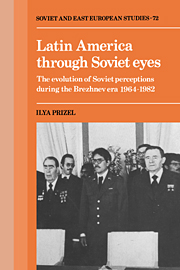 Latin America through Soviet Eyes
Latin America through Soviet Eyes Latin America, although a part of the Third World, has several characteristics that make it unique among developing continents. Unlike Asia and Africa, Latin America is basically dominated by a single linguistic and cultural pattern. However, the belief that all Latin American countries are identical because of the predominance of the Iberian languages and Catholicism is, of course, incorrect. Nevertheless, with the exception of the Arab world, Latin America is unique in its cultural communality.
Latin America's level of economic and social development certainly makes the region a part of the Third World. As part of the global economic periphery, it relies on the export of primary commodities and the import of capital and industrial goods. Yet Latin America is far more developed than Africa and most of Asia. As a result of significant industrial development, some initiated as early as the 1930s and further accelerated during and after World War II, Latin American society is far more developed, with an older and a more distinct urban population than that of most developing regions. Thus, while much of Latin America still retains its traditional social structure of latifundism, parts of the continent are now heavily industrialized, and a large proletariat and middle class have entered the Latin American political panorama.
Unlike most of the Third World, where the majority of the existing states are less than fifty years old, almost all Latin American states attained their independence by the 1820s, and thus the tradition of a nation-state is more established in Latin America than in many other parts of the world.
To save this book to your Kindle, first ensure [email protected] is added to your Approved Personal Document E-mail List under your Personal Document Settings on the Manage Your Content and Devices page of your Amazon account. Then enter the ‘name’ part of your Kindle email address below. Find out more about saving to your Kindle.
Note you can select to save to either the @free.kindle.com or @kindle.com variations. ‘@free.kindle.com’ emails are free but can only be saved to your device when it is connected to wi-fi. ‘@kindle.com’ emails can be delivered even when you are not connected to wi-fi, but note that service fees apply.
Find out more about the Kindle Personal Document Service.
To save content items to your account, please confirm that you agree to abide by our usage policies. If this is the first time you use this feature, you will be asked to authorise Cambridge Core to connect with your account. Find out more about saving content to Dropbox.
To save content items to your account, please confirm that you agree to abide by our usage policies. If this is the first time you use this feature, you will be asked to authorise Cambridge Core to connect with your account. Find out more about saving content to Google Drive.